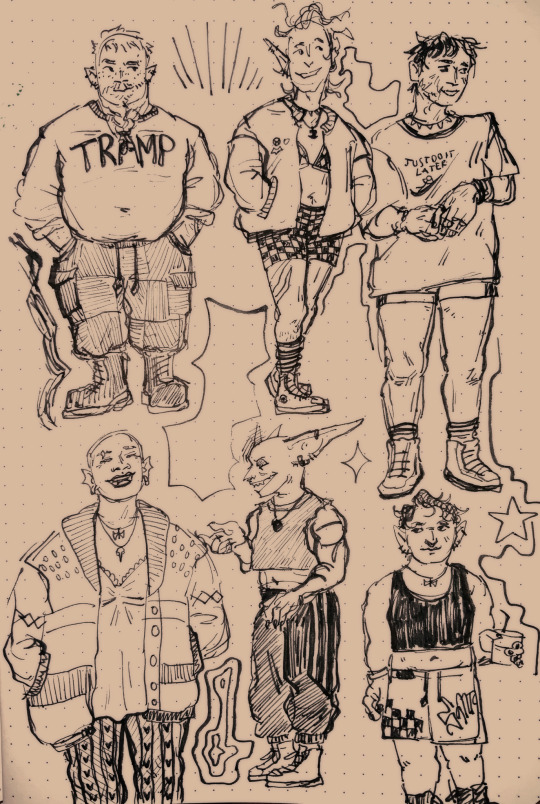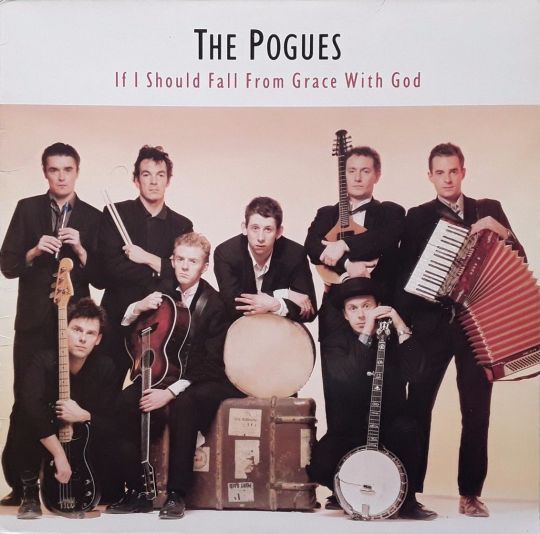#tramp are an irish punk band that i love
Explore tagged Tumblr posts
Text
in 2020 i did an rqg ootd where i drew characters in my outfits and i’m gonna bring it back. please other artists do this i wanna see ! (i have a problem w checkerboard and halerquin pattern clothes. i love them so much.)

ID: a sketchbook page of ink drawings of zolf, cel, sasha, azu, grizzop and hamid. zolf is stood with his hands in his pockets wearing a boxy crew neck jumper with the word TRAMP across the chest and striped patchwork cargo trousers and boots. cel, also with their hands in their pockets is wearing a harlequin patterned bralette and checkered shorts with a bomber jacket, striped socks and converse. sasha is stood fidgeting with her hands in front of her chest, in an oversized tshirt that says ‘JUST DO IT LATER’ with a stickman lying on a tick and white shorts with a black side panel and vans. azu is only seen from the thighs up, hands in her pockets. she is wearing a short, floaty dress under a huge cardigan with different patterned panels and fishnet tights that have hearts on them. grizzop is stood facing the left and speaking with his hands, wearing a croppped tank top and oversized black joggers with converse. hamid is stood holding a an iced drink in a cropped black halter neck top, and long shorts with a checkerboard pattern on the left leg and a signature on the right with a pair of boots. there are small doodles around them to fill space. end ID
#rqg#rusty quill gaming#rqgaming#rqg art#zolf smith#sasha rackett#cel sidebottom#azubuike#grizzop drik acht amsterdam#hamid saleh haroun al tahan#rqg azu#rqg zolf#rqg sasha#rqg cel#rqg hamid#rqg grizzop#jasp draws#rqgootd#tramp are an irish punk band that i love#if any of them somehow see this love u guys x
94 notes
·
View notes
Text
231: The Pogues // If I Should Fall from Grace with God

If I Should Fall from Grace with God The Pogues 1988, Stiff
Take my hand, and dry your tears babe Take my hand, forget your fears babe There’s no pain, there’s no more sorrow They’re all gone, gone in the years babe
Ah Shane, another man surely claimed by the number one cause of death in Ireland: Irishness. Sometimes it felt like you had to take your finger and fish around in his horrible mouth for all the poetry you’d been told was in there, but if you kept at it you’d always pull out some slurred gem eventually. Like a lot of men of my genre, to me the Pogues personified down-but-not-out romance, the sort of music for cavorting and resisting but also for sliding your heavy boots along some dusted wood floor, with your hands around a woman’s waist and your exhausted nose in her good-smelling hair. They made masculine music, certainly, but in that manner that admits tears and tenderness among men, the way enough beer can blur the stiff boundary between straight dudes and whiskey can burn right through it by the end of a night. And they made smart music too, cognizant of history, ever on the side of the common person, but with a maniac zest for bloody myths and black-humoured political sloganeering.

MacGowan loved doomed poets like Federico Garcia Lorca and Brendan Behan, and it seemed that in his understanding there was no separating the doom from the poetry. Certainly he was avid in his commitment to both. In his lyrics and in his stage presence, he presented the figure of a tattered, drunken tramp, whose low state gives him vision, reckless freedom, and the right to broad sentimentality. It’s a pose that’s existed about as long as literature itself has, and there’s plenty of Irish and English folk songs that lean into the trope—what MacGowan, via his punk roots, brings to the table is that he sounds like that character when he sings. It’s moving when a ruinous drunk opens their gob and a high pure “Danny Boy” voice emerges. But with MacGowan, you feel like you’re right there in the bar or the prison cell or the ghostly pirate ship where the action is happening.
Of course, the Pogues were always more than just Shane, and it’s not unlikely he’d be a very obscure figure today if he hadn’t joined forces with such a formidable crew of instrumentalists. Though I’m partial to the MacGowan-dominated Rum Sodomy & the Lash, their most successful record, If I Should Fall from Grace with God, is the moment the band and their brilliant frontman achieved equilibrium. Many of the album’s finest songs are co-writes between MacGowan and banjo player Jem Finer, while new additions (and actual Irishmen) Terry Woods and Philip Chevron (himself passed away in 2013) each contribute moving originals. The band is every bit as put-together as Shane is not, but the record finds them as always shifting gracefully between hellraising punk, rare old dewy folk, and honest-to-God Christmas music without once seeming out of their element. On the better than respectable (though less than classic) albums that followed, they would effectively take up the slack left by their decreasingly functional singer. Even when Shane was often little more than a reeking stage prop, they remained a force in concert.
youtube
I own the first three Pogues records (and the Poguetry in Motion EP), and prior to today I hadn’t decided which I would write about. But when I heard the news, I knew immediately it would be Grace’s “The Broad Majestic Shannon” that would be the song to make me weep; and that decided it. Lesser known than the similarly swinging “Fairytale of New York,” but no less special to my heart, it tells in plain speech of the pain and relief in time’s passing. As MacGowan told it, “Shannon” is “a song about an Irishman returning to his hometown in County Tipperary after many years of living in London, and finding that everything about the place he grew up in has changed or disappeared.” He remembers a last drink with friends and a lover, a pensive moment sat at a crossroads where he took the place in a final time before pushing off. Sometime later, he returns to a wall where that crossroads once stood and stands by it a while, pushing around some old rubbish with his foot before shaking his head wryly at himself for being so sentimental about it. Threading those two moments in time there’s the chorus I quoted at the top of this piece, this rich, tender, accepting thing. On the first pass through, it could be the speaker comforting his loved ones on the eve of his departure; on the second, it seems the memory of his own words gently chides and comforts him. “The Broad Majestic Shannon” makes the iron, inescapable fact that all people and things must pass away sound like a blessing, and that coming to accept this fact is the requirement that makes truly living possible. Poets tend to be denied the benefits of their own insights, but they say even in his ruin Shane was content with his lot. He loved and was loved. And now he’s gone where there are no tears or cops or dentists, and we have our time together before we go too.
youtube
231/365
#shane macgowan#the pogues#celtic rock#folk punk#'80s music#fairytale of new york#broad majestic shannon#tribute#music review#vinyl record#dentistry#whiskey
6 notes
·
View notes